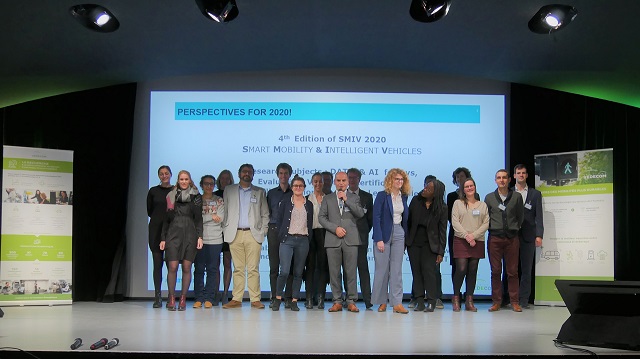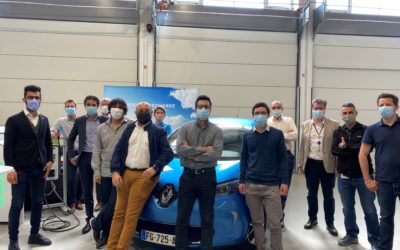SMIV: now in its fourth year and set for longevity
The VEDECOM Institute’s annual scientific conference on Smart Mobility and Intelligent Vehicle (SMIV) took place on 12 November. This year’s main theme was electromobility and collaboration between onboard (in-vehicle) and offboard (infrastructure) with a multidisciplinary approach starting from usage in order to focus on human-centric technology. The event was held at the Espace Saint-Martin in the heart of Paris: a more central and accessible venue for a conference with an international flavour.
SMIV: young and international in its fourth year
Longevity… surely is the term that springs to mind for this fourth SMIV meet. Focussed on particularly relevant issues, this year’s edition sealed the longer-term future of the event.
Located in Paris’s 3rd arrondissement, the conference brought together VEDECOM’s entire ecosystem, from industrial players to academics, based around issues related to the business model of electromobility and collaboration between the vehicle and its environment.
Result: 250 attendees, compared with 180 the previous year. A young, very international audience for a fully English-speaking conference. And diversity in terms of participants also, with many of the Institute’s international partners having accepted to participate alongside VEDECOM’s researchers. We hosted representatives from Switzerland (Dirk Lauinger), Germany (Dr Uta Burghard) and the Netherlands (Rick Wolbertus). VEDECOM was also delighted to welcome as a keynote speaker Professor Ramteen Sioshansi from the Ohio State University, introducing the first session of scientific presentations on economic challenges in electromobility. Renowned French research bodies such as INRIA and CEA were also represented, with Dr Fawzi Nashashibi, Programme Director at RITS (INRIA), introducing the second session and Dr Raphael David (CEA) speaking about the design of onboard systems for the vehicles of tomorrow.
Two sessions to reflect on the scientific and technical challenges of sustainable mobility
The day was divided into two parts, providing an opportunity to present the latest research findings on sustainable mobility, the scientific and technical challenges ahead and the economic and political issues involved.
The first session, entitled “Sustainable and Electric Mobility”, considered the challenges and issues of electromobility.

This covered issues including the charging infrastructure or market acceptance of new solutions to increase the range of electric vehicles.
The second session, “The intelligent vehicle and its collaboration with the infrastructure”, focussed more on communication and connectivity between the autonomous vehicle and its environment: connected infrastructures, man-machine interfaces (MMI), enhanced perception, etc.

“In your view, what is SMIV?”
At the close of a day rich in both scientific and technical material, Féthi Ben Ouezdou, Scientific Director of the Institute, summed up SMIV in three short phrases: “Scientific excellence, strategic partnership for VEDECOM, sharing of outstanding research topics”. By way of conclusion, let’s simply quote a few of our participants.
“SMIV is a very worthwhile conference in terms of scientific contributions, but also for networking, as it provides a forum for meeting with researchers in all fields and key industry players. It’s highly beneficial for the autonomous vehicle domain.” Dr Fawzi Nashashibi
“VEDECOM really does provide a unique opportunity with its SMIV conference. We can discuss not just scientific methods, but also market conditions, and debate on all the outstanding issues yet to be resolved.” Icaro Freitas-Gomes (VEDECOM doctoral student)
“It’s a great opportunity to see how people from different countries are working on electric and autonomous vehicles.” Dr Rick Wolbertus (Amsterdam University of Applied Sciences, TU Delft)
“We are delighted to have had such high attendance with over 250 people participating. Please join us again next year when we’ll be covering R&D topics related to the use of data and AI for the assessment, validation and certification of autonomous vehicles, as well as new mobility solutions within a societal and legal framework. We plan to run two sessions based on performance validation and the impact of new mobility solutions for organising urban spaces”, concludes Féthi Ben Ouezdou.
Articles récents :
European 5G-MOBIX Project French site Demonstration and Seminar
5G for connected and automated cooperative mobility: towards greater safety and efficiency 21 April 2022, 9 AM - 6 PM Organisation : VEDECOM, Catapult, AKKA Technologies and VALEO Location: VEDECOM headquarters at mobiLab and Satory tracks, Versailles. 23 bis allée...
E-mobility: a successfull demonstration of the Certificate Trust List for Plug & Charge interoperability
The Certificate Trust List has been demonstrated on the 2nd of June 2021 as a technical solution for ISO 15118 Plug and Charge interoperability. The objective is to simplify the user experience wherever he is and guarantee the interoperability between any vehicle and...
“Machine Learning for the distributed and dynamic management of a fleet of autonomous taxis and shuttles”
Thesis defence of Tatiana BABICHEVA « Machine Learning for the distributed and dynamic management of a fleet of autonomous taxis and shuttles » 10 mars 2021 - 9h30 Online : Zoom Follow this event : [button...



